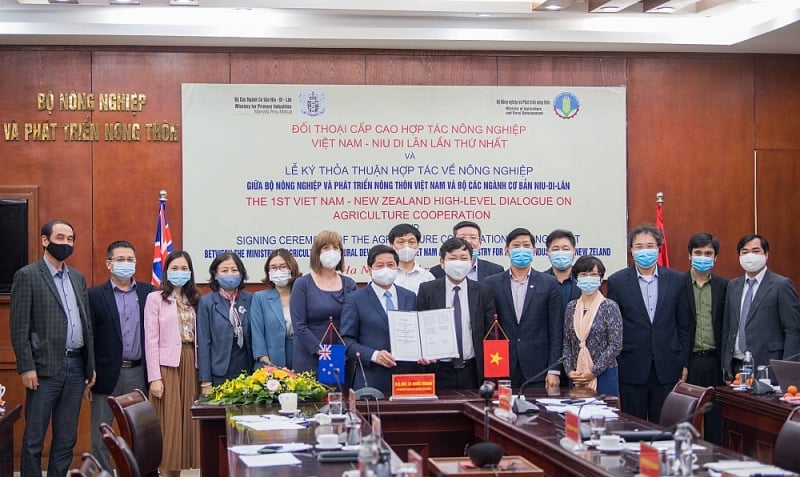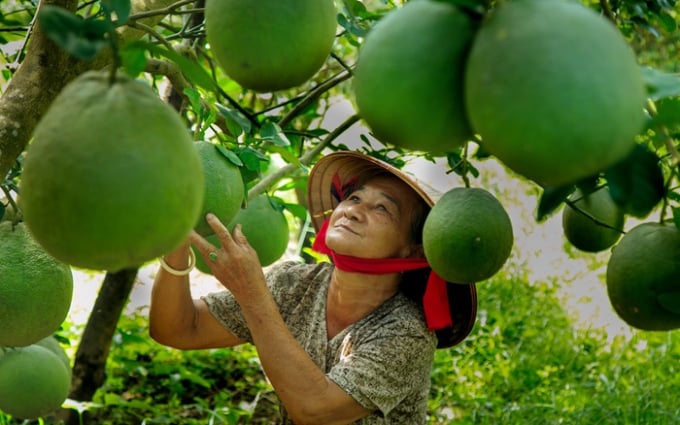November 27, 2025 | 20:52 GMT +7
November 27, 2025 | 20:52 GMT +7
Hotline: 0913.378.918
November 27, 2025 | 20:52 GMT +7
Hotline: 0913.378.918

The first Vietnam - New Zealand and High-level dialogue on agriculture cooperation.
On March 22, PPD sent Letter No. 637 to provincial and municipal agriculture and rural development departments; the Vietnam Fruit and Vegetables Association; and organizations and individuals asking their opinions on the "Export program on phytosanitary requirements for certain fresh fruits exported from Vietnam to New Zealand."
PPD developed a two-step pest management strategy including on-field and post-harvest for two fresh fruits exported to New Zealand, pomelo and lemon.
On the field, the cultivation area needs to be applied with integrated pest management, prioritizing biological control measures such as protecting beneficial organisms (yellow ants, pintail beetles, trident ants...), avoiding intermingling plantations with other types, and using only one variety; and, at the same time, collecting and eliminating plant residues on the field to minimize the risk of spreading harmful organisms.
Following harvest, PPD mentioned cleaning the fruits, including the mechanical removal of dangerous organisms (washing, spraying, etc.).
To maintain original traceability, each export product cultivation area and packaging facility must be assigned a code. The note certifies a manufacturing unit's compliance with three requirements: recording all stages of the production chain; recording phytosanitary measure characteristics; and product traceability in the event of a violation or request.

Director of Plant Protection Department Hoang Trung.
Regarding training courses, PPD commits to assisting localities, organizations, and people wanting to participate in New Zealand's fresh fruit export program. PPD recommended that gardeners, packing facilities, treatment facilities, exporters, and local specialized agencies send workers to a training session to learn about phytosanitary, food safety, and hygiene standards, as well as the procedure of plant quarantine treatment.
Individuals participating in the program must archive all relevant papers for at least two years. Additionally, local governments, producers, packers, processors, and exporters must be prepared to furnish papers upon New Zealand's request.
Mr. Hoang Trung, director of PPD, stated that before exporting fresh fruits to New Zealand or any other country, we must meet the standards of the importing country.
To begin, plant protection units at the national level must submit technical documents related to export products, which include groups of information such as product description, cultivation process, list of possible infected pests, plant protection measures, active ingredients used in pre-harvest, post-harvest, and pre-export preservation methods, and phytosanitary work... and "All must be provided in English," Mr. Trung shared.
According to international standards, the importing country (New Zealand) will analyze the pest risk associated with management methods while also commenting on the capacity to meet the export country's criteria – the director of PPD noted. The difference is that each nation would propose separate sampling rates and phytosanitary controls.

Pomelo and lemon are two agricultural products that are exported as fresh fruit to New Zealand.
New Zealand has a population of over 5 million people, and while the export of fresh fruits to the country has great significance, the country has also developed one of the world's strictest plant quarantine systems, Director Hoang Trung underlined.
"Successful export to New Zealand will not only demonstrate the reputation of our goods, technical competence, quarantine, and management but will also assist discussions with other nations to create markets for Vietnam," Trung explained.
In response to New Zealand's requests, the Director of PPD believes that the archive should be given appropriate consideration. Where a diary must be kept to note document planting areas; packaging facilities must have records of product quality management, and plant quarantine treatment facilities must have a PPD certificate certifying their working conditions.
In March 2022, the PPD dispatched working groups to a number of southern pomelo growing regions in order to share regulations governing the export of fresh fruit of the United States and New Zealand, allowing producers, businesses, and local officials to gain a better understanding of the exporting country's market information.
Program to export fresh fruits and vegetables from Vietnam to New Zealand
Translated by Linh Linh

(VAN) China’s cooking oil is suddenly flooding into India. It all comes down to a soybean surplus that Beijing doesn’t quite know what to do with.

(VAN) An Giang promotes supply-demand connections, standardizes quality and builds value chains, creating a foundation for sustainable bird’s nest development and aiming to expand exports.
/2025/11/24/5339-4-nongnghiep-075331.jpg)
(VAN) Recently, the conference on 'Sustainable Fisheries Linkage Chain - Tilapia for Export' took place in Tien Hai commune, Hung Yen province.
/2025/11/21/4309-2-153400_128.jpg)
(VAN) Green and low-emission rice is paving the way for Vietnamese rice to enter high-end markets, marking the beginning of a transformation journey toward greening and elevating the national rice brand.

(VAN) ‘Right to Win’ outlines a national action plan that shapes a new vision for Viet Nam’s agriculture in an era of renewal and global integration.

(VAN) Lam Dong’s farmed sturgeon output this year is expected to reach 2,300 tons, worth VND 450 billion, affirming the brand’s position on the market.

(VAN) A surge in Ukrainian egg exports, largely driven by soaring sales to the UK over the last few years, has notably pushed up egg prices on the domestic market.